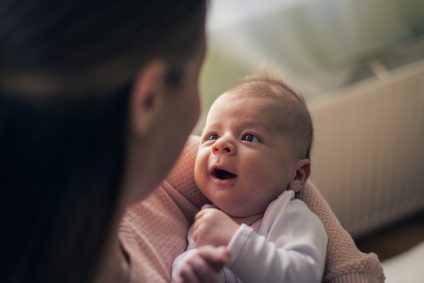
One of the great ironies of the philosophy of attachment parenting is that is contradicts what we know about infant attachment.
The founding studies of Attachment Theory were led by scientists like John Bowlby, Harry Harlow and D.W. Winnicott. Their most critical finding was that human contact was more important than any particular parenting practice. For example, Harry Harlow’s monkey experiments demonstrated beyond doubt that mothers matter more than milk.
[pullquote align=”right” cite=”” link=”” color=”” class=”” size=””]Breastfeeding doesn’t create the bond between mother and child, comfort does.
[/pullquote]
We produced a perfectly proportioned streamlined body stripped of unnecessary bulges and appendices… The surrogate was made from a block of wood, covered with sponge rubber, and sheathed in tan cotton terry cloth. A light bulb behind her radiated heat. The result was a mother, soft, warm, and tender …
Harlow also constructed wire monkey mother-substitutes.
…[W]e also designed and constructed a second mother surrogate, a surrogate in which we deliberately built less than the maximal capability for contact comfort. This surrogate mother … is made of wire-mesh, a substance entirely adequate to provide postural support and nursing capability, and she is warmed by radiant heat. Her body differs in no essential way from that of the cloth mother surrogate other than in the quality of the contact comfort which she can supply.
The babies had access to both the cloth and wire-mother substitutes:

Harlow varied which substitute could feed the babies:
This is what he found:

The babies greatly preferred the cloth mother even when the wire mother was the only one that could provide food.
He wrote:
These data make it obvious that contact comfort is a variable of overwhelming importance in the development of affectional response, whereas lactation is a variable of negligible importance. With age and opportunity to learn, subjects with the lactating wire mother showed decreasing responsiveness to her and increasing responsiveness to the nonlactating cloth mother …
Interestingly, the baby monkeys fed on formula were much healthier than their breastfed peers:
We had separated more than 60 of these animals from their mothers 6 to 12 hours after birth and suckled them on tiny bottles. The infant mortality was only a small fraction of what would have obtained had we let the monkey mothers raise their infants. Our bottle- fed babies were healthier and heavier than monkey-mother-reared infants … thanks to synthetic diets, vitamins, iron extracts, penicillin, chloromycetin, 5% glucose, and constant, tender, loving care.
What can we learn from Harlow’s monkey experiments, experiments that are at the heart of the core of Attachment Theory?
Mothers matter more than milk.
Babies become attached to whomever offers comfort, not to whomever offers milk. Breastfeeding (or formula feeding) doesn’t create the bond between mother and child, comfort does.
Why do lactivists and attachment parenting advocates ignore this central finding of Attachment Theory? It’s because lactivism isn’t about what’s good for babies; it’s about forcing women to breastfeed. Attachment parenting isn’t about what’s good for babies, either; it’s about forcing women back into the home occupied by only by traditional parenting practices. It’s at heart a religious philosophy, not the product of scientific evidence.
What does this mean for mothers?
It means that your baby needs YOU, not your breastmilk. If you want to breastfeed, go right ahead, but if you don’t want to breastfeed, there’s no evidence that formula feeding has any impact on the mother-infant bond. And if you are having trouble breastfeeding, there is no value in letting your baby go hungry or enduring pain or sacrificing your mental health in an effort to provide the supposed “extra” benefit of breastfeeding. The supposed extra benefit is trivial.
The real benefit of infant feeding comes from the mother, not from the milk.

